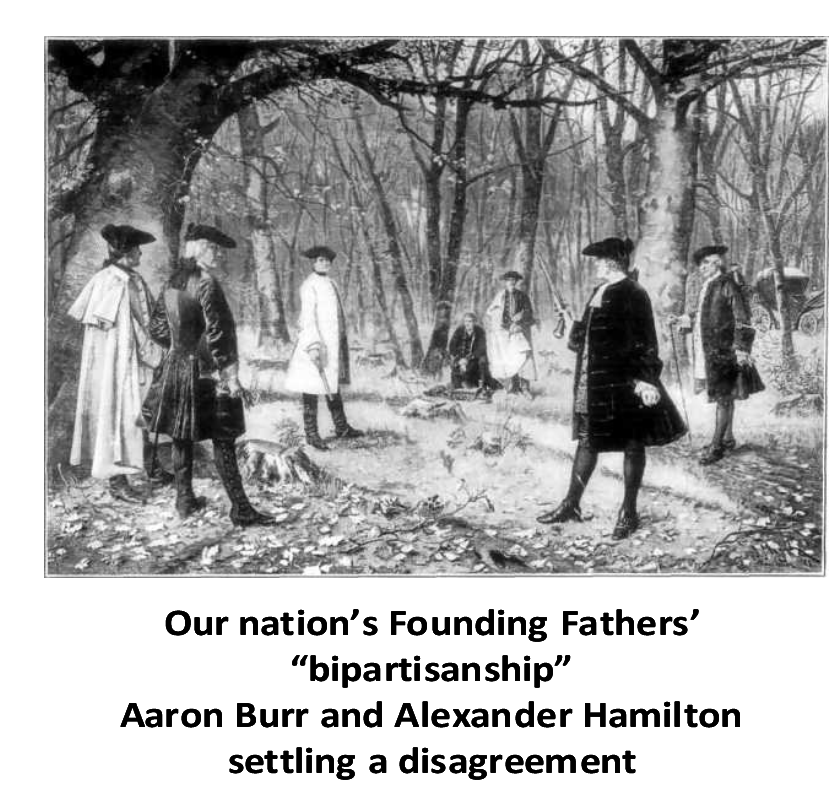Last weekend, I visited my friends Bob and Peg Kelly, enjoyed their
breezy porch after a nice lunch. Those who remember Bob’s column in
The Salem News will be pleased to know he is doing well and working
now on a novel.
His 2008 book, “The
National Debt of the United States, 1941 to 2008,” is one of my
essential reference books, and I recently completed his 2011 “Neck &
Neck to the White House: The Closest Presidential Elections,
1796-2000.” This is a great summer read for a variety of reasons,
not least among them the definite possibility that the 2012 election
will have to be added in a second edition next year.
Reading history in
general gives one a sense of perspective; as broadcaster Paul Harvey
said, “In times like these, it is good to remember that there have
always been times like these.”
Those who deplore the
partisan nature of today’s politics need this perspective: Start
with Kelly’s report on the hard-fought elections of two of our
now-revered Founding Fathers. About the race to replace George
Washington, he writes, “Political parties in 1796 did not exist.”
Still, John Adams ... “had opposition, and it was nasty.” Both he
and Thomas Jefferson, among others, were running for the position of
president; the runner-up would become vice president.
“Adams, like
Washington, believed in a strong central government. ... Jefferson
feared centralized power. Factions were formed and the foundation
for political parties was unwittingly formed by both men — once
friends, now political enemies ...”
As we know, Adams
narrowly won; the contest was repeated in 1800, with Jefferson
becoming our third president. His vice president was
 Aaron Burr, who
would, while still in that position, kill political opponent
Alexander Hamilton in a duel. So much for “reaching across the
aisle”
in the early days of the Republic.
Aaron Burr, who
would, while still in that position, kill political opponent
Alexander Hamilton in a duel. So much for “reaching across the
aisle”
in the early days of the Republic.
Adams and Jefferson
regained their friendship before they died, and isn’t it nice to see
George H.W. Bush and Bill Clinton hanging out together on various
projects? Their 1992 election wasn’t close enough to make the book,
though.
The first close
election in which I voted was the 1968 battle between Hubert
Humphrey and Richard Nixon. Kelly writes, “Money was important in
the (also close Kennedy-Nixon) 1960 election, but it arrived for
good in 1968, with a roar. And politics hasn’t been the same since.
... Packaging and packagers became part of the political culture.
Being liked became as important as being qualified.”
Starting to sound
familiar? My next close election was Gerald Ford vs. Jimmy Carter,
and then of course George W. Bush vs. Al Gore. So I can believe that
in three of the modern close elections, my vote was important, even
when my candidate lost, because it could easily have gone the other
way.
The theme of Kelly’s
book is that “the other way” in close elections often makes a big
difference in the direction of the country. Along with listing
policy initiatives, he cites the important U.S. Supreme Court
decisions that followed these elections, many of which have had
major effects on our culture.
What I like about his
theme is the notion that in a democratic republic, each of us
matters, that we can make a difference. Of course, we should choose
the right candidate. This is where my enthusiasm for voting in
general starts to waver. I’ve considered starting a new organization
named “If You Don’t Know What the Heck You are Doing, Don’t Vote,”
which we’ll call “The League of Stay-Home Voters” for short.
Because you are reading
a newspaper, you probably won’t qualify for membership. Whether we
agree or disagree, at least you will have information with which to
determine your decision. The same is true of citizens who watch the
news and political debates, listen to talk radio. But what do we do
about the others?
We learned in high
school civics class about the responsibility to vote; the teacher
probably mentioned the responsibility to follow the election debate
first. But I know people who are clueless about issues yet proudly
proclaim that of course they always vote. Some blindly follow the
party of their parents; others vote independent without
independently researching the differences that still exist between
the parties (note 1796 debate about the size and scope of the
federal government).
Nothing much we can do
about those who pay few taxes and vote for politicians who will give
them more free goodies. The need for these politicians to keep
adding “takers” is behind the concern about voter fraud, with
several states passing laws requiring photo IDs before handing
someone a ballot. Massachusetts does not have such a requirement,
though we do need a photo ID for driving a car and checking in for
some medical appointments.
As Ben Stein recently
said, “Fathom the hypocrisy of a Government that requires every
citizen to prove they are insured ... but not everyone must prove
they are a citizen.”
It’s election year
2012: time for voters to read their newspaper and perhaps Bob
Kelly’s book, find the best candidates, maybe volunteer for one.
This could be the year to make a difference.